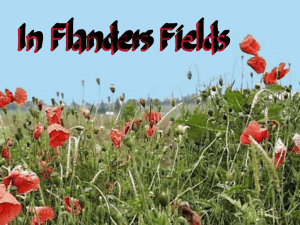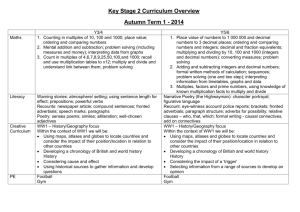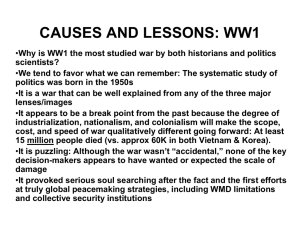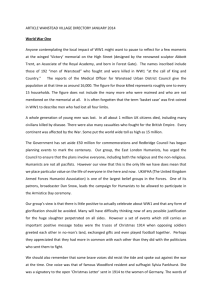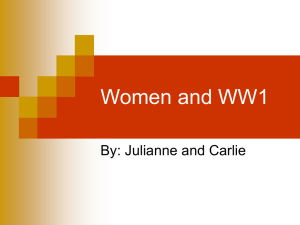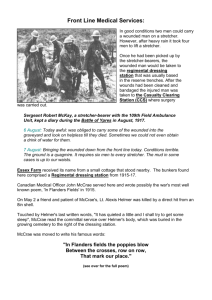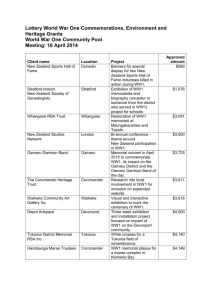WWI Historical Documents
advertisement
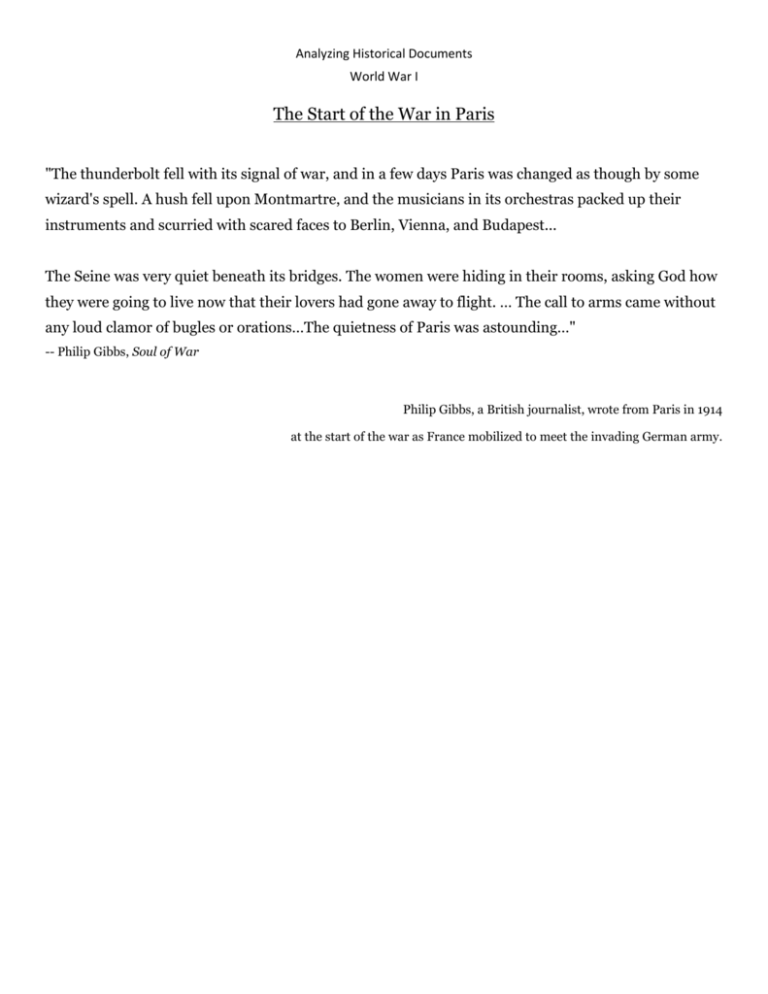
Analyzing Historical Documents World War I The Start of the War in Paris "The thunderbolt fell with its signal of war, and in a few days Paris was changed as though by some wizard's spell. A hush fell upon Montmartre, and the musicians in its orchestras packed up their instruments and scurried with scared faces to Berlin, Vienna, and Budapest... The Seine was very quiet beneath its bridges. The women were hiding in their rooms, asking God how they were going to live now that their lovers had gone away to flight. … The call to arms came without any loud clamor of bugles or orations…The quietness of Paris was astounding…" -- Philip Gibbs, Soul of War Philip Gibbs, a British journalist, wrote from Paris in 1914 at the start of the war as France mobilized to meet the invading German army. Analyzing Historical Documents World War I Journal of Solider As the War had to be, I shall always be glad I was able to play even a negligible part in it, or I should never have known with such certainty the madness of it. During training I was aware only of the glamour of War. I prepared myself for it with enthusiasm, and bayoneted and clubbed the stuffed sacks representing the enemy with a sort of exalted ferocity. When I made my debut in the line I had a cheerful conviction that nothing would hit me. And I remember standing on the fire-step for the first time and saying to myself exultantly: "You're in it at last! You're in it! The greatest thing that's ever happened!" Lice and wind-up came into my life about the same time. At stand-to one morning a flight of whizzbangs skimmed the top of the trench. The man next to me went down with a scream and half his face gone. The sand-bag in front of me was ripped open and I was blinded and half-choked with its contents. My first spell in the line lasted three weeks. Water was scarce, and even the tea ration was so short there was none left over for shaving. I had a nine days' growth of beard when we went down to rest. Some of us looked like Crimean veterans and we all began to feel like it. My socks were embedded in my feet with caked mud and filth and had to be removed with a knife. Lack of rest became a torment. Sleeping at the post was a court-martial affair, with death or field punishment and a long term of imprisonment as the penalty. But, try as I would not to fall asleep, I often woke from a delectable dream with a start to find myself confronted with No Man's Land. The trenches were crowded with men all packed up and unable to go, and it rained - heavens, how it rained! Hour after hour we stood there in the rising flood, helpless as sheep in the pen, while the guns did their worst. The next time I went into the line a spot of gas sent me out of it for good. Six months afterwards I appeared in the streets again as a civilian with a profound hatred for war and everything it implies. Private Harold Saunders enlisted in the 14th London (London Scottish) in November 1915, and went to France with the 2nd Battalion in June 1916. When the 6oth Division left France for Salonika he was left behind with a septic heel. He was transferred to the 1st Battalion, and was with them till a whiff of gas at Cambrai completed the wreck in October 1917. He was finally discharged April 1918. Analyzing Historical Documents World War I In Flanders Fields By John McCrae In Flanders fields the poppies blow Between the crosses, row on row That mark our place; and in the sky The larks, still bravely singing, fly Scarce heard amid the guns below. We are the Dead. Short days ago We lived, felt dawn, saw sunset glow, Loved and were loved, and now we lie In Flanders fields. Take up our quarrel with the foe: To you from failing hands we throw The torch; be yours to hold it high. If ye break faith with us who die We shall not sleep, though poppies grow In Flanders fields. In Flanders Fields and Other Poems, was published in 1919. Analyzing Historical Documents World War I Australian Propaganda Post card from Australia Published during World War I Analyzing Historical Documents World War I German Propaganda Published in Germany 1915 Analyzing Historical Documents World War I Why Germany was involved It might be very difficult to understand that the large majority of the German population had the feeling that they were engaged in a war that had been forced upon them. That they were a part of a war in which they defended their very existence. And that this was a war that was fought not for material possessions, that was not fought for the annexation of territory, for colonies, but that it was a war in which Germany, herself, defended her bare existence. Indeed, it might be difficult to understand that that was the common feeling in Germany. In order to be able to understand this, I think one has to look back to the previous years, the last four decades. Germany had been united in 1871, considered herself to be a young nation — a latecomer. The world had been carved up before they had arrived. The world in terms of the colonies, the world in terms of power politics had been finalized, and the Germans came late. Yet, they felt they deserved a position within this world, according to their self-esteem, according to their size, according to their grandiose history leading back into the Middle Ages. For quite some time, there was a discussion of the inevitability of war common amongst all European societies. There was the fear that with German unification, the power structure had changed to a degree, that now war had to be waged. That war had become inevitable. -Bernard Hupparuf World War I Historian Analyzing Historical Documents World War I World War I Firsts http://www.history.com/topics/world-war-i/world-war-i-history Analyzing Historical Documents World War I Adapted from BBC: Viewpoint: 10 big myths about World War One debunked Much of what we think we know about the 1914-18 conflict is wrong, writes historian Dan Snow. No war in history attracts more controversy and myth than World War One. For the soldiers who fought it was in some ways better than previous conflicts, and in some ways worse. By setting it apart as uniquely awful we are blinding ourselves to the reality of not just WW1 but war in general. We are also in danger of belittling the experience of soldiers and civilians caught up in countless other appalling conflicts throughout history and the present day. 1. It was the bloodiest war in history to that point Fifty years before WW1 broke out, southern China was torn apart by an even bloodier conflict. Conservative estimates of the dead in the 14-year Taiping rebellion start at between 20 million and 30 million. Around 17 million soldiers and civilians were killed during WW1. Although more Britons died in WW1 than any other conflict, the bloodiest war in our history relative to population size is the Civil War, which raged in the mid-17th Century. A far higher proportion of the population of the British Isles were killed than the less than 2% who died in WW1. By contrast, around 4% of the population of England and Wales, and considerably more than that in Scotland and Ireland, are thought to have been killed in the Civil War. 2. Most soldiers died In the UK around six million men were mobilized, and of those just over 700,000 were killed. That's around 11.5%. In fact, as a British soldier you were more likely to die during the Crimean War (185356) than in WW1. 3. Tactics on the Western Front remained unchanged despite repeated failure Never have tactics and technology changed so radically in four years of fighting. It was a time of extraordinary innovation. In 1914 generals on horseback galloped across battlefields as men in cloth caps charged the enemy without the necessary covering fire. Both sides were overwhelmingly armed with rifles. Four years later, steel-helmeted combat teams dashed forward protected by a curtain of artillery shells. They were now armed with flame throwers, portable machine-guns and grenades fired from rifles. Above, planes, which in 1914 would have appeared unimaginably sophisticated, dueled in the skies, some carrying experimental wireless radio sets, reporting real-time reconnaissance. Adapted from BBC: Viewpoint: 10 big myths about World War One debunked 25 February 2014
